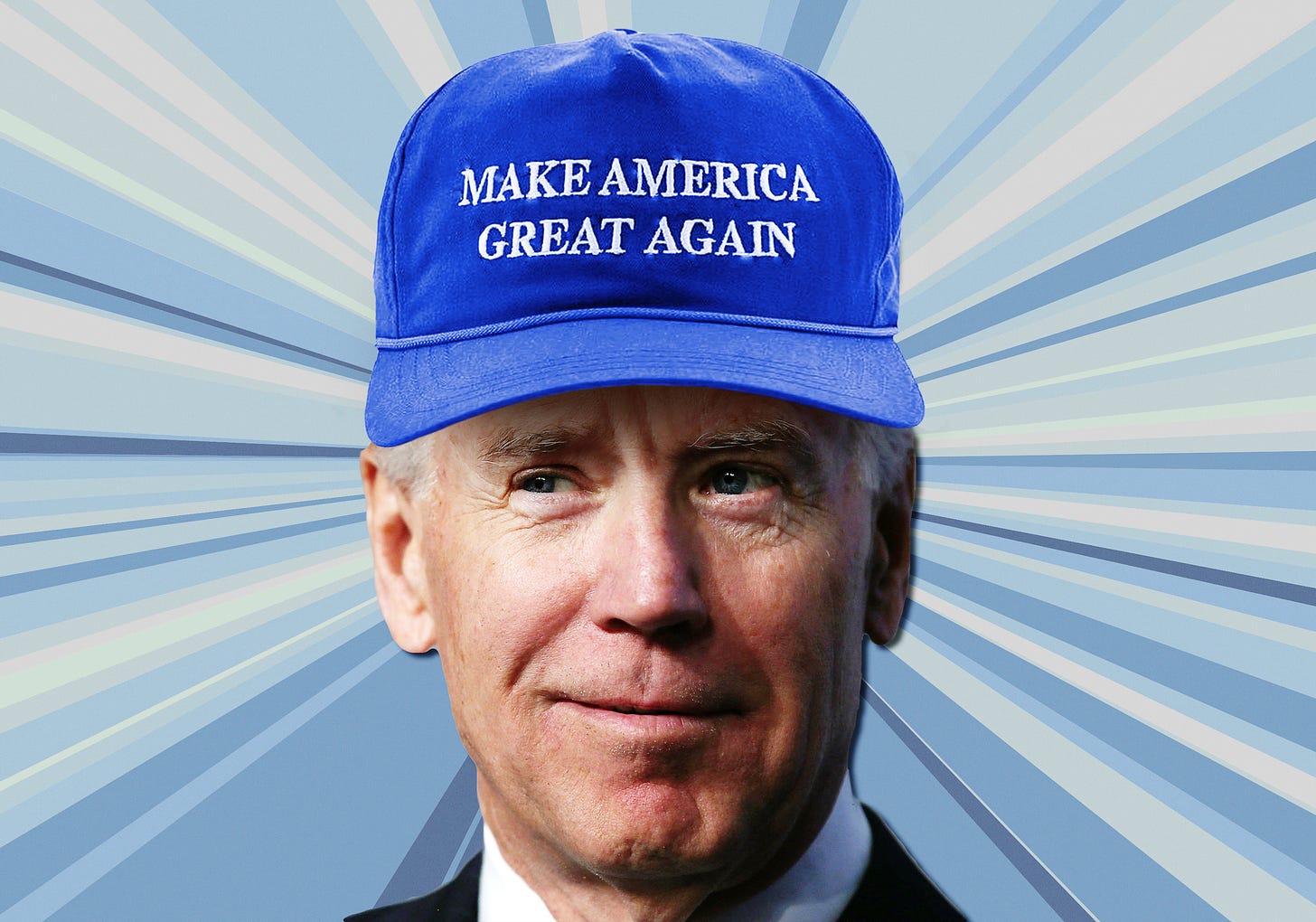What If Biden Isn't the "Most Electable"?
1. No to Joe
After the Houston debate last week a friend wrote in to take issue with my generally bullish view of Joe Biden's prospects against Donald Trump. His very smart thoughts are worth sharing in full:
The conventional wisdom that Biden is the most electable is based, to me, on a blindness to a pretty clear trend in global politics over roughly the past decade. Look around the world of Western, liberal democracies and you can count one—one!—major election for the top government job in which a candidate embodying the governing establishment won: Angela Merkel in Germany. And that was a fourth-termer in a country that has pretty much been the most resilient to the global populist forces that are riling politics everywhere else, so an understandable outlier. In every other major country, elections are being won by "outsider" candidates whose appeal is that they will shake up a system that the global public is growing more and more dissatisfied with. Even Emmanuel Macron, who by resumé is the consummate insider, had to run as the ultimate outsider, head of a newly-formed party whose calling card was that its candidates had never run for office before. In the United Kingdom, whose politics probably most closely track America's, the leaders of the two major parties are Boris Johnson and Jeremy Corbyn! That trend has been true in the United States as well. Just look at our last two Presidents: Barack Obama and Donald Trump. Both ran as the most "change"-oriented candidates in modern times. Western publics are angry at the system and looking for candidates who will shake it up. Biden is the embodiment of the opposite. I think this is a big reason Clinton—who at this point in the race many assumed was also the most electable—lost. Sure, this election could be different. Americans could be tired of Trump's shake-it-up routine and want the comfort of Stable Joe. That's obviously his pitch, but to succeed he'll have to defy pretty strong global and national headwinds. "But," you say, "all the polls show Joe in front in head-to-head matchups!" C'mon. We know better. Polls of head-to-heads at this point in the race are heavily impacted by name recognition and impressions of a candidate that will change dramatically as the race heat's up. And here again is where the CW on Biden seems to be blind to a key fact. Biden has run before. Numerous times. And never done well at all. Why? Because he's not a good campaigner. He never even made it into the top tier in any of his previous races. Heck, he finished well behind Hillary Clinton the last time he ran, who was a pretty poor campaigner herself. People seem to be forgetting Biden's history. The odds are much more likely that his poll numbers will drop, not rise, as people are reminded of this. Whereas many of the lesser-known candidates have more room to go up as they become better known. And many of them are already showing themselves to be better on the stump and TV. Your second point is that unless you want to abolish private health insurance, you need to vote for Biden. Here too, I wish your analysis was right, but I fear it is not. I wish it was right because it assumes, nobly, that people vote based on policy. But the evidence suggests that is not the case. Voters act based on all sorts of non-rational and non-policy based decision frameworks. My best read is that the voters around the world who are voting for outsider candidates aren't voting for specific policy prescriptions—by and large they're voting against a system they see as not working for them. That's what elected Donald Trump. I think it's also what elected Barack Obama. And if it holds, it would potentially make the Warren-Sanders type candidates actually more electable against Trump. Not because people want to get rid of private health insurance, but because people want to shake up the system (rail against Wall Street, or corporations, or what have you) and they no longer feel Trump is doing that and want to roll the dice with someone else. As a practical matter it's also highly unlikely that Congress would abolish private health insurance even if there is a wave election in Democrats' favor. And it seems reasonable to assume that among voters who favor universal healthcare and some sort of single-payer system, the number who are absolutists on an immediate end to private health care are quite small. The rest support the macro-goal of a universal public option and are probably pretty agnostic on the details of how to get there. If they see someone committed to getting there and demonstrating that commitment with strident campaign talk, that's probably enough to earn their support—and let someone else work out the details later. It's odd that objections to this form of voting ("but you're voting for someone who wants to abolish private health insurance!!") tend to come from the center right, which tend also to be the group that points out when someone calls us a democracy that we're actually a republic—that we elect representatives to work out the details. That may be why people would support a candidate making bold promises like this, but still not actually want it to happen (or happen right away). And I should add, it’s not just the Sanders/Warren candidacies that could claim the insurgent mantle. I think almost any of the other candidates—Harris, Pete, Booker, Beto, etc—could claim a mantle of outsider change. Pretty much only Biden would have to run on the bet that Americans want to return to the pre-Trump status quo. I struggle to see why, given the global evidence, that’s a good bet. And I like Biden. This is just pure how to beat Trump strategy to me.
Verrrrrrrrrry interesting . . .
2. All Races Tighten
The great Fred Barnes taught me the two iron laws of politics: (1) Winning beats losing. and (2) All races tighten. The first law is a rebuke to smarks (like me) who will occasionally construct elaborate rationalizations as to why, actually, it would be better for Party X to lose Election Y. The second is the observation that in a competitive environment, nobody wins 70 percent to 30 percent. If you put two candidates in a race and one of them leads 80-20 at the outset, the final result will be a lot closer. It doesn't matter if one of the candidates is the second-coming of Lincoln and the other is the second coming of Gallagher. Tightening is what has happened with the Democratic primary race since early summer, when Joe Biden was lapping the field. Today his lead is barely double-digits over his next closest rivals. Anyone who thought he was simply going to walk away with the nomination was deluding themselves. If Biden is to be the Democratic nominee, it will only be after a brutal, white-knuckle victory. And you can say the same about every other person running. Except that while everyone is asking how Biden is going to deal with Warren, it's not clear to me how Warren is going to deal with Bernie. What is Warren's point of contrast with Sanders? It's not electability—he polls better against Trump than she does. It's not age. The three top Dems are all basically the same age. It's not candor—Sanders is much more transparent about the costs of his plans than Warren is. It's not charisma—Warren is a wonky candidate while Sanders is a crazy-grandpa movement. Her strategy, so far as I can tell, is to deal with Sanders by out-organizing him in Iowa, beating him in New Hampshire, and then hoping momentum does the rest. But all of that assumes that Bernie stands still and lets her hold the initiative. And that no one else—Biden, Harris, Mayor Pete—makes a run at her, either. My own view of the race is that the most likely scenario is a Warren victory in Iowa, a muddled finish in New Hampshire, Biden wins in South Carolina and Nevada, and then a long, grinding campaign that ends with the party establishment throwing its weight behind Biden and him eeking out just enough delegates to avoid a brokered convention. (And then trying to heal the rift by taking Kamala Harris as his VP.) Would I take that parlay to the bank? Not unless you gave me pretty good odds. But it seems to me more likely than any other single alternative.
3. Watch Talk / On Design
Regular readers know that I spend more time than I should thinking about design. And also about watches. This weekend the two subjects merged when I stumbled across two of the worst design choices I've ever seen in the world of horology. These choices have been like splinters in my brain. And now I want to share them with you. The first comes from Breitling's redesigned Superocean II:

It's a handsome diver and there is a great deal to like about this watch. Except for one thing. Breitling decided to put a 24-hour scale inside the main Arabic numbers. I like this choice a lot. It adds functionality and a Breitling isn't really a Breitling unless it's dial is exceptionally busy. But look what they've done with the "15":

What. The. Fork. The 1500 mark is one-quarter occluded by the date-window so that the box on the window literally runs right through the "5". Because of the size and color of the numbers, this gives the eye the sense of looking at a single four-digit number inexplicably rendered both in white and black. But that's not the real problem. The real problem is that even to get to this, the "15" has been slid out of line with the other interior numbers. Take a close look: It's closer to the center of the dial than 18, 21, and 24. Where the other interior numerals create a circle, the half-covered 15 deforms the circle. It's not an exaggeration to say that I don't think I could put this monstrosity on my wrist without feeling a constant itch. I'll show you the other design disaster tomorrow. Believe it or not, it's even worse.



